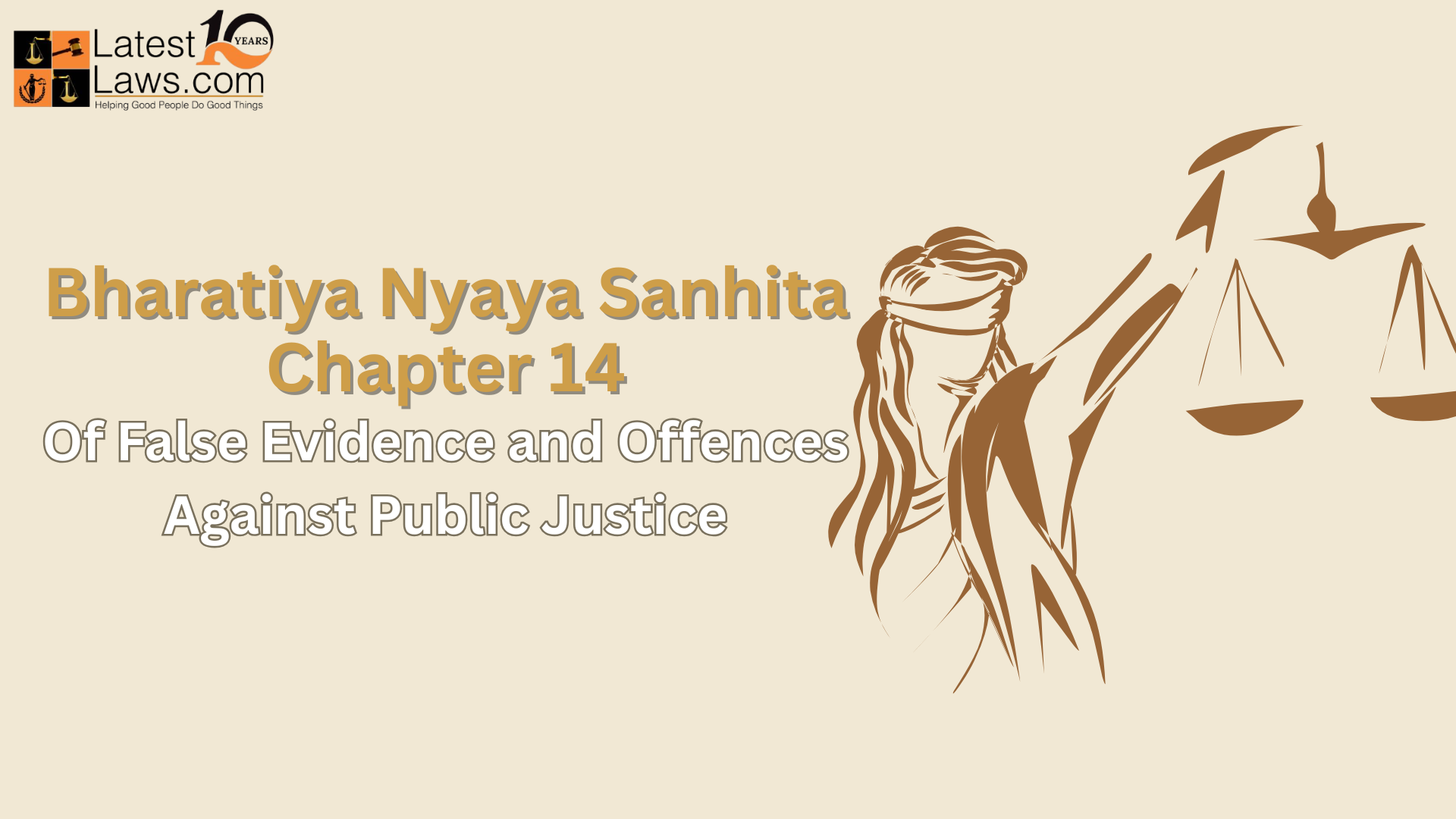Sponsor
BNS Chapter 14 – Of False Evidence and Offences Against Public Justice

India’s legal system depends heavily on honesty, facts, and fairness. If anyone tries to lie to the court, hide evidence, misuse their power, or help criminals escape punishment, it weakens public trust in justice. To protect against such actions, the Bharatiya Nyaya Sanhita, 2023 (BNS) includes a dedicated chapter: Chapter 14 – Of False Evidence and Offences Against Public Justice.
This chapter covers different ways people may interfere with justice and how the law punishes such actions. Here, we explain each important section of Chapter 14 with easy language and simple examples, so that even students and general readers can understand it clearly.
Giving False Evidence or Misleading Courts
Section 227 – Giving False Evidence
If someone lies under oath during a trial or any legal inquiry, it's considered false evidence.
-
Example: A witness falsely says he saw the accused commit a crime, even though he didn’t.
Section 228 – Fabricating False Evidence
Creating fake documents, videos, or other records to present in court is fabricating evidence.
-
Example: Submitting a forged medical certificate to prove injuries that never happened.
Section 229 – Punishment for False Evidence
This section punishes those who lie or fabricate evidence, with up to 7 years in jail and a fine.
Section 230 & 231 – False Evidence to Wrongly Convict
If false evidence leads to an innocent person being sentenced to death or life imprisonment, the person giving the false evidence can face similar punishment.
-
Example: Planting fake *** weapons or giving false statements to get someone convicted of ***.
Section 232 – Threatening to Lie
Threatening someone to give false evidence in court is also a punishable offence.
Section 233 – Using Known False Evidence
Even if you didn’t create the false evidence, using it knowingly in court is also illegal.
False Certificates and Declarations
Section 234 – Issuing False Certificate
Anyone issuing a certificate they know is false (like doctors or government officers) is punishable.
Section 235 – Using False Certificate
Using a certificate known to be false, such as a fake birth or medical certificate, is also a crime.
Section 236 & 237 – False Declarations as Evidence
If a false statement is made in a legally accepted declaration, or used knowingly, it attracts punishment.
Hiding Evidence or Protecting Criminals
Section 238 – Destroying or Hiding Evidence
Destroying documents or lying to police to protect someone is a punishable offence.
Section 239 – Failure to Report Offence
If you're legally required to report a crime and you don't, you're committing an offence.
-
Example: A government doctor who sees signs of abuse but fails to report them.
Section 240 – Giving False Information About a Crime
Making a false FIR or blaming someone innocent is punishable.
Section 241 – Destroying Records
Destroying digital or physical records to stop them from being used in court is illegal.
Fraud in Legal Proceedings and Property Claims
Section 242 – Impersonating in Court
Pretending to be someone else during a legal matter.
Section 243 – Hiding Property
Illegally hiding your property to avoid court seizure is punishable.
Section 244 to 247 – Making Fake Property Claims or Decrees
These sections punish people who make false property claims, or get court orders for money not owed.
-
Example: Suing someone with fake documents to claim land you don't own.
False Accusations and Helping Criminals
Section 248 – False Accusation to Harm Someone
Filing a police case knowing the person is innocent, just to harm them.
Section 249 – Giving Shelter to Criminals
Harbouring criminals to help them escape the law.
Section 250 & 251 – Accepting or Offering Bribe to Protect Criminals
If someone takes or offers money to hide a criminal’s identity or stop their arrest.
Section 252 – Bribes to Help Recover Stolen Property
Demanding money in return for helping someone get back stolen items.
Section 253 & 254 – Helping Escaped Prisoners or Robbers
If you knowingly shelter robbers or escaped criminals, you're liable.
Corruption by Public Servants
Section 255 – Helping Criminals by Breaking Law
If a public servant intentionally breaks the law to protect someone or their property.
Section 256 – Creating False Government Records
Any officer making incorrect records to save someone from punishment.
Section 257 – Corrupt Court Officers
If a judicial officer knowingly makes wrong decisions or false reports.
Section 258 – Illegal Detention by Officials
Wrongly jailing or detaining someone despite knowing it’s illegal.
Negligence and Obstruction by Officials
Sections 259 to 264 – Escape or Negligence in Arrests
These cover situations where a public servant doesn’t arrest someone, or allows their escape.
Section 265 – Resisting Own Arrest
If someone resists lawful arrest or helps someone escape.
Section 266 – Breaking Bail or Remission Conditions
If a person violates terms of bail or a reduced sentence.
Section 267 – Misbehaving in Court
Interrupting court proceedings or insulting judges is punishable.
Section 268 – Pretending to Be Court Official
Impersonating someone appointed by the court (e.g., an assessor).
Section 269 – Violating Bail or Bond
Failing to appear in court after being released on bail.
Final Thoughts
Chapter 14 of the Bharatiya Nyaya Sanhita is a safeguard for justice. It tells citizens and officials: don’t lie, don’t cheat, don’t misuse power, and don’t help criminals. The aim is simple: protect the process of law so that the truth can prevail.
Whether you're a student, aspiring lawyer, or a curious citizen, understanding these laws helps you know your rights and duties better. A just society can only function when justice is protected at every step.





